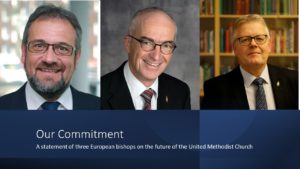Our Commitment
We are at a defining moment in the life and history of the United Methodist Church.
Through church history, Christians numerous times have engaged in theological debates and had strong disagreements over doctrine and ethics, at times this has led to reforms and even schisms. For almost five decades, United Methodists have disagreed over the understanding of human sexuality, which has caused immense pain and hurt to many people. Our inability to solve the impasse caused by our disagreement has led us to a point, where some sort of separation appears inevitable.

United Methodists all over the globe are liturgical, contemporary, charismatic, social activists, low church, high church, urban, suburban, small town, rural and much more. We are children, youth, young adults, adults, senior adults, new Christians and mature Christians. We are a melting pot of different ethnicities and cultures – we are present on four continents, in more than 45 countries, and we are made up of an unknown number of diverse cultures and languages. Nevertheless, we are one United Methodist Church, and with all the challenges this entails, we, as your bishops, are committed to be shepherds of the whole flock, and thereby provide leadership toward the goal of understanding, reconciliation and unity in the body of Christ.
Unambiguously, we wish to say that all of our members, clergy, local churches and annual conferences will continue to have a home in the “Future United Methodist Church”, whether they consider themselves liberal, evangelical, progressive, traditionalist, middle of the road, conservative, centrist or something else. Too long, have we labelled each other theologically and imposed positions and perceptions on one another in ways that were superficial and disrespectful of the sincerity of our beliefs. We hold on to our Wesleyan heritage that “the living core of the Christian faith is revealed in Scripture, illuminated by tradition, vivified in personal experience, and confirmed by reason”.
We are committed to the United Methodist Church and we pledge to continue our episcopal leadership in the UMC valuing the personal dedication of members and clergy who will remain in agreement with the present stance on the practice of homosexuality. Expecting the polity of the United Methodist Church with regard to human sexuality to change in the future, we will exercise our leadership in such a way that those, who choose to remain in the UMC, may continue to express their personal conviction in alignment with the present stance and will not be forced to participate in acts that are against their personal, religious convictions.
We are longing for a United Methodist Church that will move towards new forms of being a connectional church, a General Conference focused on global essentials, and an empowerment of regions for contextually relevant forms of living our common mission mandate. Deeply rooted in the Doctrinal Standards of the UMC, we pledge to exercise our episcopal role in ways that enable as many United Methodists, lay and clergy, as are willing to remain in the UMC and – together – to continue in making disciples of Jesus Christ for the transformation of the world.
Despite potential separations, the United Methodist Church will remain a faithful witness to the Christian gospel. We are committed to pursue the calling of making disciples of Jesus Christ for the transformation of the world. We, the initially signing three bishops who have created this statement, serve episcopal areas with vast diversities in Northern, Western and Central Eastern Europe and North Africa.
February 2021 - First signing bishops:
Christian Alsted, Harald Rückert, Patrick Streiff
Read the statement as a PDF here
Other bishops – active and retired - who want to sign the statement may contact Bishop Patrick Streiff at: bishop@umc-cse.org

